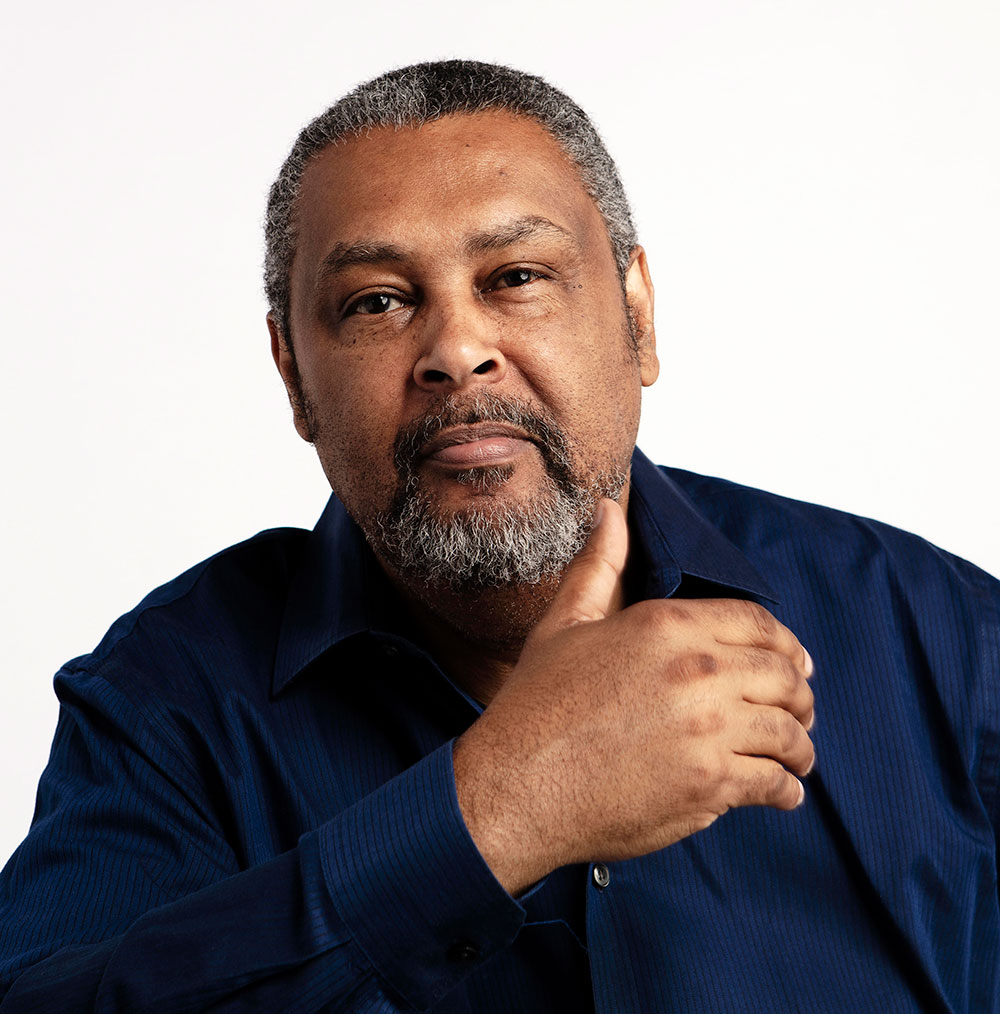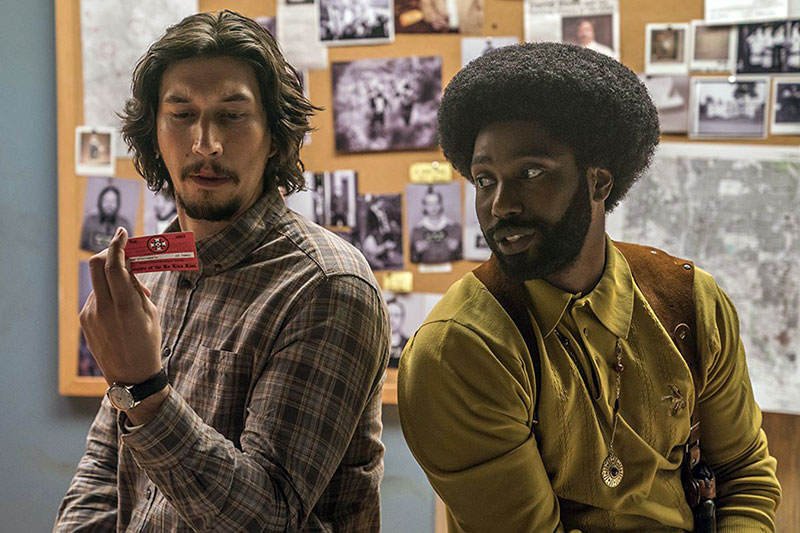
Kevin Willmott’s life was saved by a Molotov cocktail—one he didn’t throw.
It was 1975, the exhilarating peak of the Black Power movement. Confronted with open racism at his Junction City high school, Willmott felt compelled to act. He and friends began “terrorizing” the school, setting off fire alarms and lighting firecrackers in the cafeteria. He was expelled when authorities discovered a homemade bomb in his locker.
In a nuanced take straight out of one of his films, Willmott believes the incident could have destroyed his life, but he doesn’t regret it, because his desire to act saved his life by getting him to a school where people cared about his future.
At St. Xavier Catholic High School in Junction City, Willmott met a white priest, Father Frank Coady, who not only allowed, but required him to talk about race and all the struggles he had been holding inside.
Fast forward 33 years and Willmott is still talking about race and still feeling compelled to act. His films are arguably more incendiary than Molotov cocktails, and the blast zone of his latest, BlacKkKlansman, is international.
The film, co-written with Spike Lee and directed by Lee, is a true tale of a black cop infiltrating the Klu Klux Klan in the 1970s laced with real footage of last year’s racial violence in Charlottesville. Beautifully acted and endowed with a lush, funky period soundtrack, BlacKkKlansman received a 10-minute standing ovation at the Cannes Film Festival and took home the Grand Prix.
The film opened nationwide August 10th to critical acclaim and hauled in $11 million the first weekend.
Willmott, who earned a bachelor’s in drama from Marymount College in Salina and an MFA in dramatic writing at NYU, has collaborated with Lee since 2004, when Lee contacted him after seeing Willmott’s searing mockumentary C.S.A.: Confederate States of America. Most recently, the two worked together on the 2015’s controversial and critically successful Chi-Raq.
Shortly before flying off to attend premieres of BlacKkKlansman in New York and Los Angeles, Willmott sat down with In Kansas City inside the vaulted living room of his home, a former church in a leafy, brick-streeted neighborhood in Lawrence.
Leaning back on the couch with the open, relaxed posture of a man who is comfortable in his skin, as the French say, Willmott speaks in a soft baritone, punctuated by unexpected bursts of ringing laughter. His gentle demeanor soothes as his raw, unflinching answers shock. This ability to provide a calm space in which discomfort can reverberate endlessly is a hallmark of Willmott’s films.
With surgical precision over the course of an hour, he dissects race relations in America, the imperative to act in response to injustice, his high-profile protest of Kansas’ concealed-carry law, and the question he believes was hanging in the air above the applause at Cannes.
You live in a very, very white town…
(Laughing) Yes, I do!
You were born in a very white state…
(Laughing) I was born in a very white state.
You went to a pretty white college…
(Laughing) I went to a very white college! I haven’t been able to get away from white people.
How does that inform your identity as a black man?
That’s the first time anybody has asked me that straight up.
Junction City, where I grew up, was a white town, but it was also a multicultural town because of the Army (at Ft. Riley) and the war brides. Everybody was biracial in my neighborhood, except us. My father looked white, but he wasn’t white. And it made me kind of understand that race matters and that race doesn’t matter.
How does it matter and not matter?
It doesn’t matter because we are all just human beings, but it matters because you have to know who you are, and you have to be proud of who you are, and you have to kind of be aware of who you are. And one of the things that I saw a lot of growing up is that white people want to make you them.
Everything will be fine if you act like us.
Yes, and “I can be your friend, and you’re kind of like me already, Kevin.”
And that’s cool that you’re kind of like me.
That’s cool.
Because you’re not like those black black people.
A guy actually said to me in college: “There’s niggers, Kevin, and then there’s you.” And he thought he was giving me a compliment.
What did you make of that?
The first time it happened it left me stunned. The next time, I made a sarcastic joke like, “That’s very white of you.”
As a filmmaker who’s been making films about race for more than 20 years, you are kind of a historian. What is your take on the recent history of race relations in America and where do you think we are headed?
You can’t talk about race and get into those issues without it being history. Even as a kid I was really into history. I should tell you one little quick story.
Sure, please.
I think this played a big part in it. When I was in 4th grade, I was at home in the evening playing with army men on the floor and a news bulletin came across the TV: Martin Luther King had been shot.
My mother goes crazy. She starts screaming and hollering, crying, she goes out on the front porch and she wants to go to Memphis and kill this man (who shot Martin Luther King), and I’m just like, “What’s going on here?”
A neighborhood man had to calm my mother down and get her in the house, and then I turned to my big brother and said, “Who’s Martin Luther King?”
Now, I was the current-events kid at school, because my mother always made us watch the news before we went to school—we’d watch CBS Morning News. And so I raised my hand in school the next day and said, “Martin Luther King was killed last night.” And, the teacher said, “We won’t be talking about that today.”
First time she’d ever said that. And of course, you know what happens when you tell a young person, “We won’t be talking about that”—that’s all you want to talk about after that.
I think that was when I really learned what it was to be black. I discovered Ebony magazine, and I took it to school and the teacher said, “What is this?” and I said, “Everybody’s black in the magazine.”
So I was educating my teachers in the 4th grade about race. And it was kind of bizarre, because I was educating myself. When you’re a kid, you don’t know who you are until somebody tells you, “This is the way the world works. There’s black people and there’s white people, and you’re black, and he’s white and he’s a Mexican.”
And this is 1968, too, so in Junction City, soldiers are going to Vietnam, they’re coming back from Vietnam, and the Black Power thing is starting to happen. The older guys in the neighborhood—I didn’t know what they were talking about, but I was listening to them. One time they talked about how there were tanks in Lawrence, and about how tanks were going to come to Junction City and get us (laughs). It was a good time to grow up in the sense that even young guys were talking about those things.
It was a very awake moment in time.
A very awake moment, and that had an effect on me, where I just expect people to talk about things.
And then the awake-ness went away in the late 70s and the 80s. People quit talking about racism and the thing to do was pretend we were past all that.
Yeah, and the reality is I’ve never stopped talking about it. And one thing that connected me with Spike is that he has never stopped talking about it. People our age, we got to see what it could be. And we got to see how it should be, right? And that expectation of response is a big part of it.
It’s not okay to not be awake.
Right. The most frustrating thing about what’s going on right now, if you’re from our generation, is you’re saying, “Why haven’t we overthrown the government at this point?” (Laughs.) I mean, how can we keep tolerating this mess? When did it become the thing to do to tolerate it?
Are you optimistic? Do you detect any signs of awakening?
There are times when it seems like everybody is pissed and ready, and then there’s times where I don’t know if we’re ready or not. And you worry about how insane things have become normalized. And that’s really bad for a nation. Because it’s always gradual. Segregation didn’t start in one day. It was like, this law got passed, and then this law got passed and then, “Oh, they’re going to segregate Washington, D.C. OK.” And then, the next thing you know, half the country is segregated.
But part of me thinks we have a profound opportunity before us to not just take the nation back but maybe make it what it should be.
What should it be?
It should be the United States of America. But we go back and forth. I use the metaphor that America started out as C.S.A. (Confederate States of America), and then Lincoln says, “I think we’re going to make it the United States of America.” And then bad things happen, and we become C.S.A. again. We get segregation, which I call “slavery light.” And then Obama happens, and it’s like, “Looks like we’re going to become the United States of America again!”
And then, what happened was like in the ghetto: Obama was turning the lights on, and the house is infested with roaches, and they all run off to hide. And now you’ve got the Roach Whisperer, and he’s called all the roaches to come out again. So now the question is, can we take it back, again, to the United States of America?
On Facebook, you refer to the president as “King Tang.” Did you wrestle with whether you should be respectful since he is president?
I don’t think you have to be respectful at all to leadership that is abusive. And he is abusive on every level. He’s abusive to the world. And the other thing is, he’s a fascist. I don’t know that he is smart enough to know that he is a fascist, but he’s selfish and greedy and mean and he doesn’t care about people. And it’s important with fascist leaders that you don’t use their name.
Why?
Because they want that. They are authoritarians. He loves the sound of his name and he loves the sound of “President” in front of his name. So you can’t give him that. And it’s not just me, but people all over the country have found names for him. Spike calls him Agent Orange.
“You know, when you’re creating a satirical joke, you look at the truth of what it is, and you examine that and try to be as honest as you can about it, and you find the absurdity in it, and then you try to find the best way to expose that.”
How do you calibrate how far you can go in a Facebook post?
I always think about it before I post something. I kind of measure what’s the best approach to getting people to understand your point. And that’s the same thing you do in screenwriting. You know, when you’re creating a satirical joke, you look at the truth of what it is, and you examine that and try to be as honest as you can about it, and you find the absurdity in it, and then you try to find the best way to expose that.
You are engaged in an ongoing protest of a Kansas law allowing concealed guns on college campuses by wearing a bulletproof vest every time you teach a class. Did you worry about whether you would face repercussions for that?
It’s the thing we were talking about before—if you’re of my generation, a response is required. That’s why I got thrown out of high school. You can’t always respond in the way you want, but you respond in some way. You don’t ignore it. You don’t accept it.
“You can’t always respond in the way you want, but you respond in some way. You don’t ignore it. You don’t accept it.”
Wearing the vest is a constant reminder that this is what’s really going on. Because they are hoping we’ll just fall asleep. My collegues have been supportive but my criticism is, for us to win this fight, more people have got to step up. I’m not saying you’ve got to wear a vest, but you’ve got to do something. If you don’t, it’s not going to go away.
What was it like getting a 10-minute standing ovation at the screening of BlacKkKlansman at the Cannes Film Festival and winning the Grand Prix?
It was very surreal. We were staying in this great hotel, the Carlton, across the street from the beach. And when it’s time to go to the theater, this motorcade pulls up, and I’ve never ridden in a motorcade. And there’s the red carpet, and I’m just a writer, so it’s not like I’m the movie star or director, but I’m on it, so that’s cool. And it’s just a crazy beautiful theater. But the big, big thing was how much the audience loved the film. Laughing out loud in places and stunned silence in others.

And at the end, you look up and here’s all these people in the balcony cheering, and I have to say I got pretty choked up. You have this moment where you think about Junction City and you think about your whole ride and all the stuff that got you there. I’m probably being way too corny about it, but it was the first moment I’ve ever had anything like that. And what made it even more powerful was it was the world saying in a way, “We’re with you.” The world is sick of this. The world is ready to respond and the question is, are we ready? The ovation, as much as it was about the movie, it was also about the fight.
Interview condensed and minimally edited for clarity.


